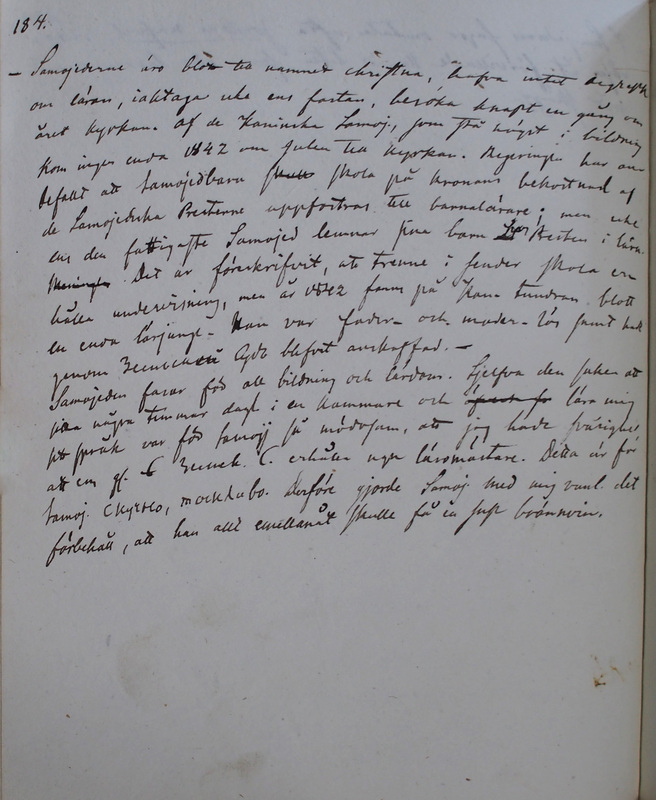Ethnographiska, historiska och statistiska anmärkningar. 184
Title
Description
| I Samojederne äro blott till namnet
christna,
hafva intet begreppHere, Castrén relies on Venianim’s knowledge. Archimandrite Veniamin was in charge of the Orthodox missionary work that took place in the European tundra of Russia in the 1820s and 1830s. During the work, most of the Nenets were baptised, new churches were built, and a few parishes founded. The discourse on the superficiality of Christianity among the Nenets goes through all the descriptions of the 19th century. (Veniamin 1855: 112–114, 71–72; Schrenk 1848: 408–412; Islavin 1847: 119–120; Chomič 1979: 15–18; Golovnev & Osherenko 1999: 53–59)
om läran, iaktaga icke ens fastan, besöka knapt en gång om året kyrkan. Af de Kaninska Samoj[eder]., som stå högst i bildning kom ingen enda 1842 om Julen till kyrkan. Regeringen har an- befallt att Samojedbarn skola på kronans bekostnad af de Samojediska presterna uppfostras till barnalärare; men icke ens den fattigaste Samojed lemna sina barn hos presten i lära.
Before the missionary work began, a school was founded for Nenets children in 1788. According to the reports of the priests, the Nenets were indeed unwilling to send their children to the schools and after four years, three had died and six had got sacked. (Veniamin 1850; Bazanov & Kaganski 1936: 20)
Det är föreskrifvit, att trenne i sender skola er- hålla undervisning, men år 1842 fann på Kan[inska]. tundran blott en enda lärjunge. Han var fader- och moder-lös samt hade genom Земский Судъ blifvit anskaffad. |
The Samoyeds are only superficially Christians; they have no idea about doctrine, do not even observe fasting, and go to church barely once a year. Of the Kanin Samoyeds, who stand highest in education, not a single one went to church at Christmas in 1842. The government has ordered that Samoyed children should, at the expense of the Crown, be raised by the Samoyed priests to be teachers of children; but not even the poorest Samoyed leaves their children with the priest at the school. It has been decreed that three [children] at a time should receive teaching, but in 1842 there was only one pupil in the Kanin tundra. He was fatherless and motherless and had been acquired by Zemskij Sud''. |
| Samojeden fasar för all bildning och lärdom. Sjelfva den saken att sitta några timmar dagl[igen]. i en kammare och lära mig sitt språk var för Samojj.[Samojeder] så mödosam, att jag hade svårighet att ens g[enom] Земск[iй]. С[удъ]. erhålla ngn[någon] läromästare. Detta är för Samoj[eden]. скучно, тоскливо. Derföre gjorde Samoj[eden]. med mig vanl[igen]. det förbehåll, att han allt emellanåt skulle få en sup brännvin.
See also Castrén 2019: 426, 445–446; 453–454, 466–467.
|
The Samoyed is terrified of all education and learning. The very matter of sitting for a few hours a day in a room and teaching me their language was so laborious for the Samoyeds that I had difficulty obtaining a teacher, even with the help of Zemskij Sud''. This is boring and tedious for the Samoyed. Therefore the Samoyed usually worked with me on condition that he would occasionally receive a drink of brandy. |

